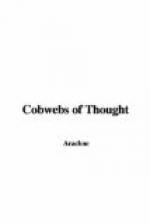intellectual self—and so on. For how
does that help us? It is the same unknown quantity
in different circumstances. The self that ponders
in thought, knows itself as the same that talks in
society. The strange power of being able to analyse
ourselves at all is one of the strangest things about
us. What a world of difference lies between the
unconscious self of the animal and this conscious
self of man! Professor James’ brilliantly
written chapter of investigation into the self leaves
us amused rather than enlightened. Against all
arguments to the contrary, we should refuse to give
up the word mind, whether it is considered vague or
defective in any or every way. Mind in all its
complexity, is what we have to investigate scientifically.
Mind in all its complexity is what the philosopher
has to explain, not mind, analysed into simple acts
of consciousness. The hypnotist talks of double,
treble and quadruple personalities with totally different
characteristics “under suggestion,” but
it helps us little for we have not yet defined mind
on its sane and normal sides. Considering the
acuteness and the sanity of the French mind, it is
somewhat strange that the French psychologists should
devote themselves chiefly to the study of the insane
and hysterical. Philosophy, though it gives us
soaring thoughts, grand speculations, and metaphysical
schemes, from Spinoza, Kant, Hegel, and Schopenhauer,
to Herbert Spencer, and Mr. Mallock, cannot give us
any knowledge in which they mutually agree. Mr.
Mallock sums up philosophy as a necessity to the mind.
We must believe in some theory of mind, some
religion, some philosophy, else life is dreary and
unlivable. This appears to be the result of his
book “The Veil of the Temple,” and this
is simply the doctrine of utility. But no philosopher,
can tell us why mind works on certain lines and not
on others, because they cannot tell us definitely
that they know what mind is. Mind is a
function of Matter: Matter is a function
of thought: Mind is Noumenon the unseen and unknown,
as contrasted with Phenomena the seen and known; the
universe, the creation of the mind; the mind, the
product of the universe. All these ideas and many
others so widely differing can none of them receive
a demonstrable proof;—these contrary statements
show how far we are from possessing any real knowledge
of what mind is. After all that has been written,
elaborated and imagined, do we actually know
more than Omar Khayam knew?
“There was the door to which I found
no key;
There was the veil through which I could
not see;
Some little talk awhile of Me and Thee
There was—and then no more
of Thee and Me.”
Philosophy is still powerless to tell us what mind is; the self, the ego always vanishes as we seem to be nearing it, it always eludes our deepest probings—we only demonstrate our failure in regard to our knowledge of it. All this is true, but should we therefore despair? If we are born with the record on the brain of the inexorable desire to know, the very failure should stimulate us to further, and greater, and more fruitful questionings.




